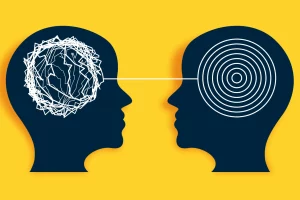
What is Emotional Intelligence? How to Improve it with the Silva Method!
Table of contents:
- EQ Vs.IQ: Why both are important?
- How both of them plays an important role in our life?
- What are Emotions?
- How Emotions are created? How Silva Method approaches emotions?
- Free Emotional Quotient Test
- Do you feel impossible to control emotions? Why is it so?
- What are the basic elements of emotional intelligence?
- 9 tips for improving emotional intelligence with the Silva Method
- What impacts does not being able to control emotions have on us?
- Real-Life Success Stories: Transformations after an Emotion Management Workshop
- Conclusion
Key Point: Not being able to control emotions can result in emotional outbursts, which can affect various key areas of your life, for example, health, relationships, career, emotional balance, time management, and spirituality.
In today’s fast-paced world, managing our emotions effectively is more crucial than ever. Emotional regulation not only impacts our mental health but also plays a significant role in our physical well-being, relationships, and overall quality of life. Whether it’s dealing with daily stressors or navigating complex interpersonal dynamics, the ability to control our emotions can be the difference between thriving and merely surviving.
So, how can you fix and manage your emotions to prevent them from flowing down the wrong path?
What exactly is emotion, and how can you control emotions with the Silva Method? How do emotions impact your life? If you are looking for the answers to these questions, then this blog is for you! Let’s understand more about emotions:
EQ Vs. IQ: Why both are important?
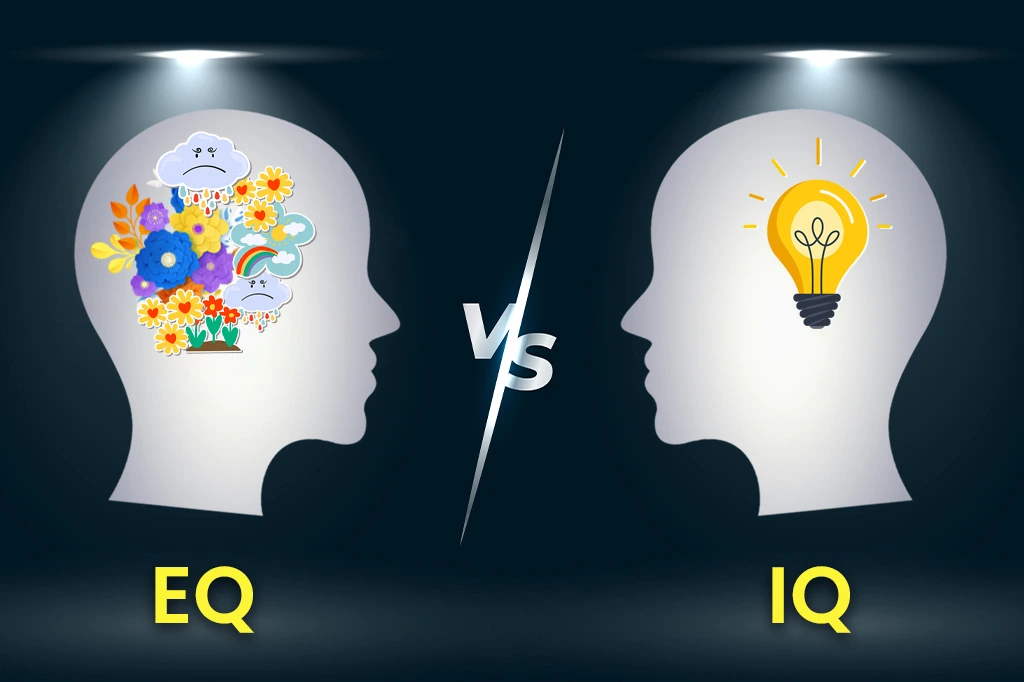
Our mind is dependent between intellectual and emotional skills. Here’s a brief of them:
Emotional Quotient (EQ): Measures emotional intelligence, including skills related to understanding and managing emotions, empathy, communication, interpersonal relationships, and resilience. EQ emphasizes emotional awareness and the ability to navigate social situations effectively.
Intelligence Quotient (IQ): Measures cognitive abilities such as logical reasoning, problem-solving skills, and analytical thinking. It focuses on intellectual capabilities and how well an individual can process information and solve complex problems.
How both of them plays an important role in our life?
Our mind is dependent between intellectual and emotional skills. Here’s a brief of them:
EQ or IQ both are equally important in various areas of life. While IQ and EQ measure different aspects of intelligence, they are not mutually exclusive. In fact, they often complement each other to achieve holistic success and fulfillment in life. For instance, a person with high IQ may innovate and develop groundbreaking ideas, but their ability to communicate these ideas effectively and build connection among peers (facilitated by EQ) can determine the success and adoption of their innovations.
However, taking an Emotional Quotient (EQ) test is ideal because it provides individuals with a clear assessment of their emotional intelligence. It offers insights into how well they understand and manage their emotions, empathize with others, and navigate social interactions.
“Feel free to check out the EQ test on the page below.”
What are emotions?
Emotions are something we all feel, but do we know how to control our emotions?
It is great to show emotions, but expressing them in the wrong place and the wrong way can really mess up your life. Being able to control emotions is quite a challenging task and is still an unsolved case.
But one thing about emotions that we can conclude is that they are complex things, and while we observe them closely, we can figure out that they can give us the power to experience emotional freedom.
Reacting to emotions is an important part, and it is vital to know how to use them in order to be more in tune with yourself and your surroundings.
“Emotions” are defined as complex psychological states that involve three distinct components: a subjective experience, a physiological response, and a behavioral or expressive response. They are integral to the human experience, influencing thoughts, behaviors, and interactions with others.
There are 8 types of emotions, which are known as “primary emotions”:
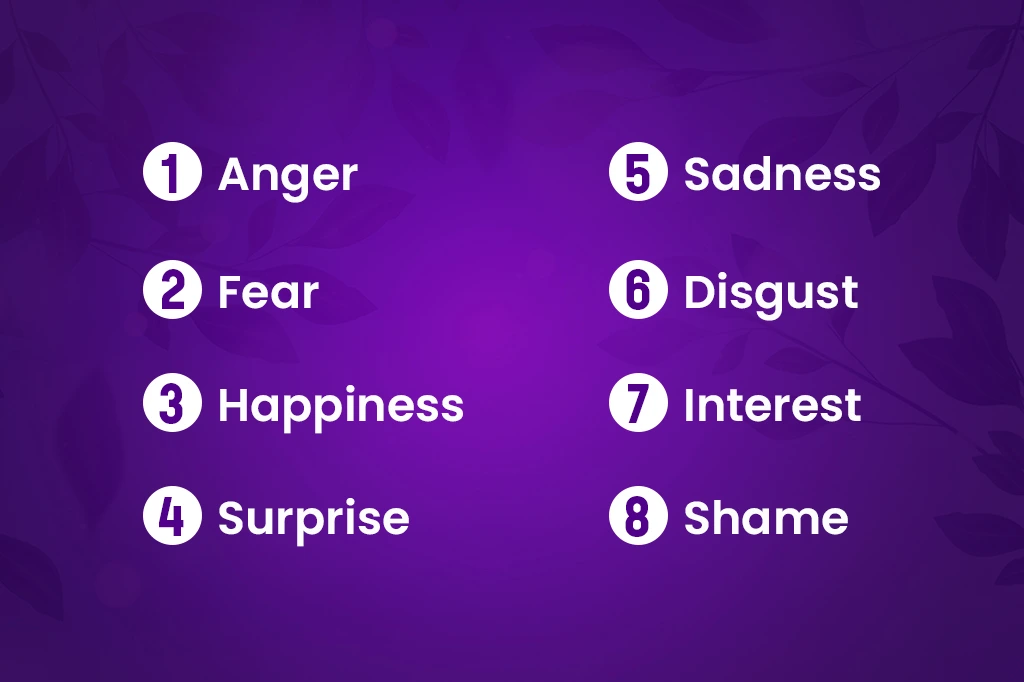
These emotions are expressed as a response to certain situations. Emotions are sometimes controllable reactions, though sometimes they may become uncontrollable. Any reactions expressed through us are created by us only.
How are emotions created? How Silva Method approach emotions?
The Silva Method, developed by José Silva, focuses on harnessing the power of the mind for self-improvement and healing. While it may not provide a detailed scientific explanation of how emotions are made, it does offer insights into managing and understanding emotions through mental techniques and practices. The Silva Method approaches emotions through the following points:
1. Mind-Body Connection
The Silva Method emphasizes the strong connection between the mind and the body. It suggests that emotions are deeply intertwined with our thoughts and mental states. By controlling our thoughts and engaging in positive mental practices, we can influence our emotional well-being.
2. Alpha and Theta States
The Silva Method teaches techniques to enter the alpha and theta states of brainwave activity, which are associated with relaxation and heightened creativity.
- Alpha State: A relaxed state of mind, often associated with daydreaming or light meditation. In this state, the mind is more receptive and open to positive suggestions and affirmations.
- Theta State: A deeper meditative state often linked to deep relaxation and access to the subconscious mind. This state is used for deeper emotional healing and understanding.
3. Visualization and Imagination
According to the Silva Method, visualization is a powerful tool for emotional management. By visualizing positive outcomes and engaging in guided imagery, individuals can reprogram their subconscious mind to foster positive emotions and reduce negative ones.
4. Positive affirmations
The Silva Method advocates the use of positive affirmations to change negative thought patterns and emotional responses. By consistently affirming positive statements, individuals can create new neural pathways that lead to more positive emotional states.
5. Self-Management Techniques
The method includes specific techniques for managing emotions, such as:
- Mirror of the Mind: A visualization technique to project desired emotional states and outcomes onto an imaginary screen, helping to manifest them in reality.
- Three Fingers Technique: A quick method to enter a focused and relaxed state to manage stress and emotional responses effectively.
6. Emotional Awareness and Control
The Silva Method encourages developing a heightened awareness of one’s emotions and the triggers that cause them. By becoming more aware, individuals can gain better control over their emotional responses and choose how they want to feel in different situations.
7. Healing and Forgiveness
Emotional healing is a significant aspect of the Silva Method. Techniques such as forgiveness exercises are used to release negative emotions like anger and resentment, promoting emotional healing and well-being.
Summary
Emotion is a complex matter but Silva Method ensures that it is possible to manage emotions. It also helps to emphasize the connection between body and mind. By fostering emotional awareness and utilizing relaxation methods, individuals can achieve greater control over their emotional experiences, leading to enhanced well-being and fulfilment.
Give Our Free Emotional Quotient (EQ) Test a Try!
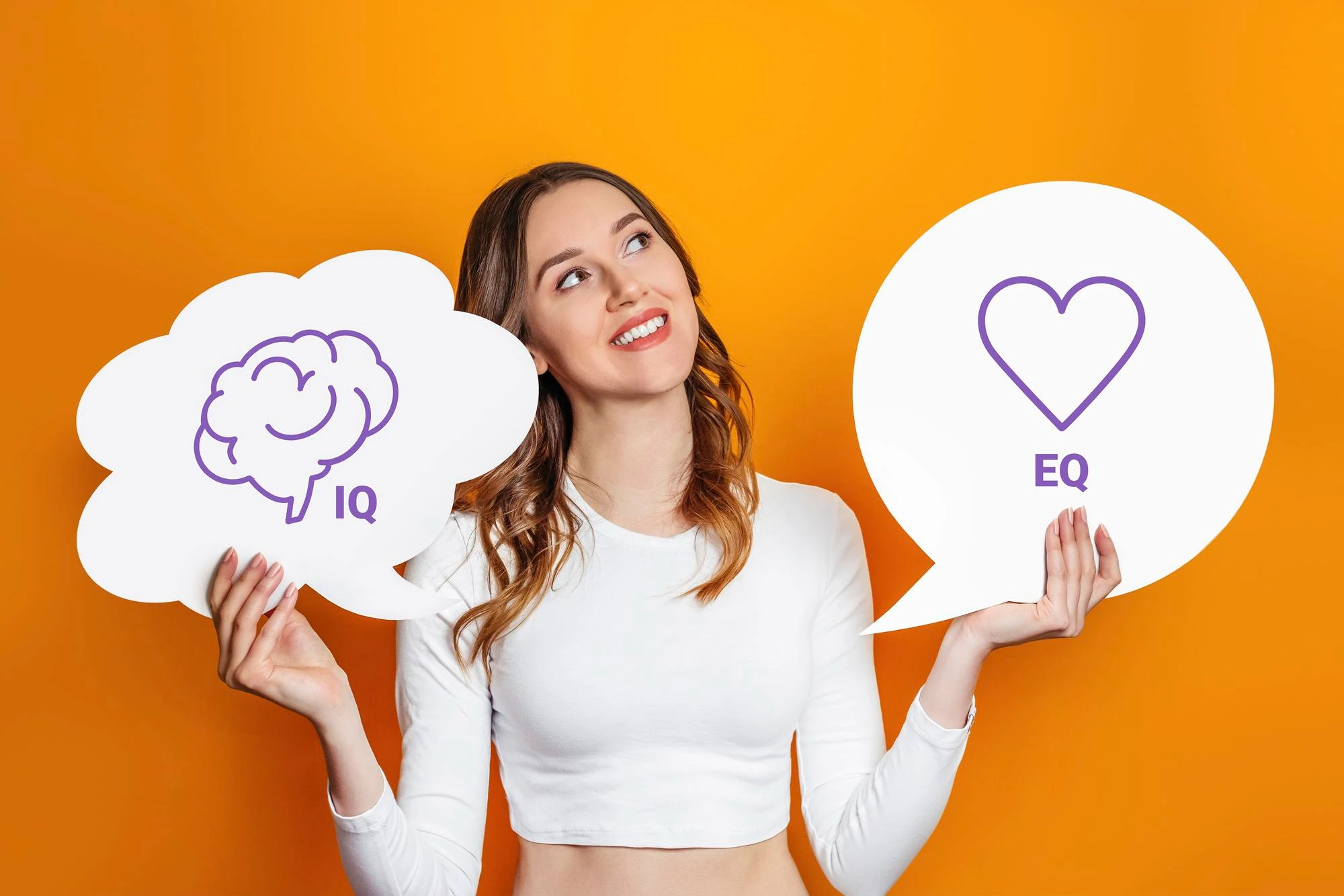
To explore more about emotional intelligence and try out our Emotional Quotient (EQ) Test,
Click on the link: https://silvamethod.com/emotional-intelligence
Do you feel it is impossible to control your emotions? Why is it so?

We understand that it is not easy to control emotions, but we have the power to control our response to them.
Controlling emotions can feel impossible due to several interconnected factors. Biologically, our brain’s structure plays a crucial role, with the amygdala triggering automatic, intense emotions such as fear and anger before the rational prefrontal cortex can intervene.
This rapid response is an evolutionary survival mechanism designed to protect us from threats. Additionally, imbalances in neurotransmitters and hormones can affect our mood regulation, making emotions feel overwhelming. Psychologically, our emotions are influenced by automatic thoughts and cognitive appraisals—how we interpret and evaluate situations. These processes often operate unconsciously and can be deeply rooted in past experiences and traumas, leading to strong, seemingly uncontrollable emotional reactions. Lastly, without effective strategies and emotional awareness, it can be challenging to manage and control these responses, contributing to the feeling that emotions are impossible to control.
What are the basic elements of emotional intelligence?
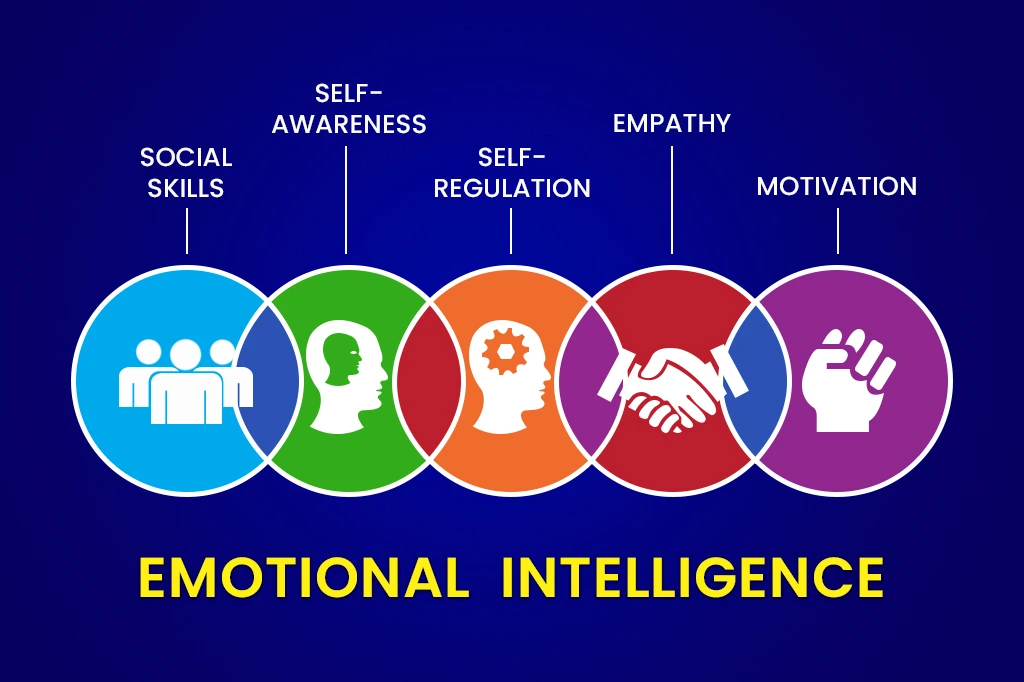
There are a few elements necessary for upgrading emotional intelligence:
1. Self-awareness: Individuals with self-awareness have the ability to observe their emotions and analyze how they react to them. It helps to get a better understanding of our strengths and weaknesses.
2. Manage emotional reactions: Having the ability to self-manage your emotions improves communication and problem-solving skills.
3. Empathy: Having empathy for others is just as important as understanding your own emotions. It helps to have better social interactions.
4. Maintain healthy relationships: Clear communication with actions and words helps to improve relationships.
9 tips for improving emotional intelligence with the Silva Method
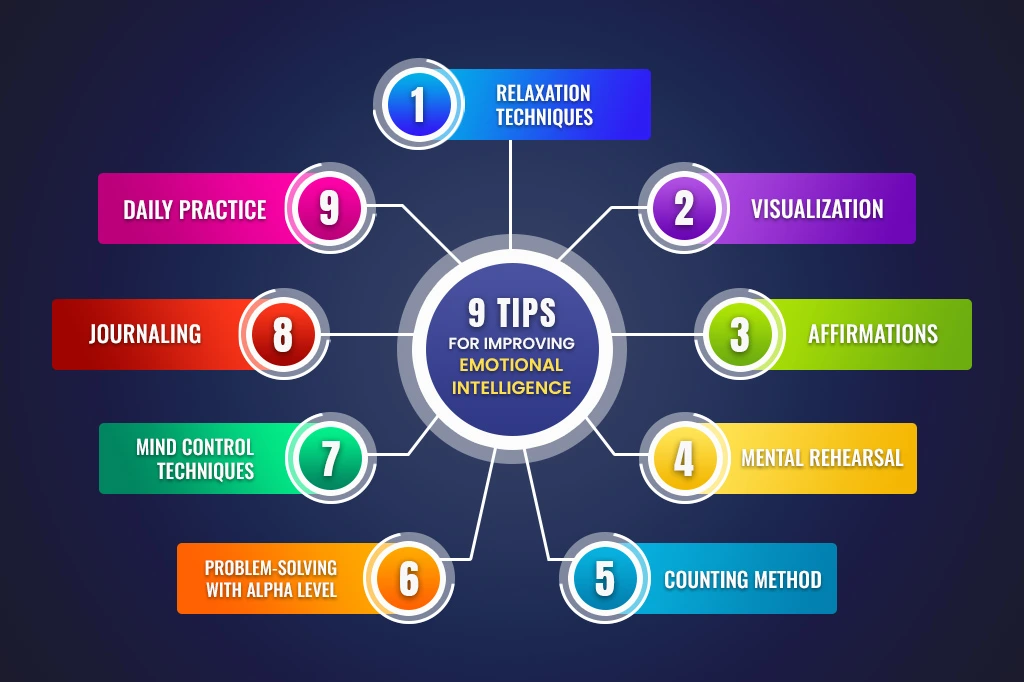
Imagine yourself going through a rough day, and you are feeling anxious and depressed about it. You may have heard casual self-help advice that may not be helpful for yourself, like “just try to control your emotions.” But it’s only easy to say when,, in reality, it is hard to execute in reality.
However, self-regulation plays a crucial role in managing emotions by fostering an individual’s ability to monitor and control their emotional responses. At its core, self-regulation begins with awareness—recognizing and accurately identifying one’s emotions and understanding the triggers behind them. This awareness allows individuals to anticipate emotional reactions and prepare accordingly. Self-regulation also involves controlling impulsive responses and promoting thoughtful and measured reactions instead of immediate, potentially harmful, emotional outbursts. This includes delaying gratification, which can lead to more rational decision-making and less emotional volatility. Emotional flexibility is another important aspect, enabling individuals to adapt their emotional responses to changing situations and consider different perspectives, which helps in managing stress and maintaining composure.
Here are a few tips necessary for improving emotional intelligence:
- Relaxation Techniques
- Meditation: Practice daily meditation to achieve a deeply relaxed state. The Silva Method emphasizes a technique called “alpha-level” meditation, which involves reaching a relaxed brainwave state.
- Deep Breathing: Practice deep breathing exercises as it is beneficial to relax your mind and body. Try to inhale in a slow pace through your nose, and exhale through your mouth.
- Visualization:
- Mental Screen: Visualize a mental screen in your mind where you project positive images and scenarios. This can help shift your focus from negative emotions to more positive, calming thoughts.
- Creative Visualization: Imagine desired outcomes vividly and in detail. For example, if you’re feeling anxious about a situation, visualize yourself handling it confidently and successfully.
- Affirmations:
- Positive Statements: Use affirmations to reinforce positive beliefs and attitudes. Repeat statements such as “I am calm and in control” or “I can handle any situation with ease.”
- Repetition: Regularly practice affirmations, especially during meditation, to instill these positive thoughts into your subconscious mind.
- Mental Rehearsal:
- Pre-Event Visualization: Before facing a potentially stressful situation, mentally rehearse it in a relaxed state. Visualize yourself managing your emotions effectively and achieving a positive outcome.
- Daily Practice: Incorporate mental rehearsal into your daily routine to build emotional resilience over time.
- Counting Method:
- Countdown Technique: Use a countdown method to enter a meditative state. For example, count backward from 10 to 1, visualizing each number and feeling more relaxed with each count.
- Anchoring Calmness: Associate the countdown with feelings of calmness and control, so you can quickly access this state in stressful situations.
- Problem-Solving with Alpha Level:
- Alpha State Problem-Solving: Reach the alpha level of relaxation and then focus on a problem causing emotional distress. Visualize potential solutions and outcomes, allowing your mind to creatively address the issue.
- Creative Solutions: Trust your subconscious to present creative and effective solutions while in this relaxed state.
- Mind Control Techniques:
- Cancel Negative Thoughts: When a negative thought or emotion arises, mentally say “cancel, cancel” and replace it with a positive thought or visualization.
- Positive Replacement: Immediately substitute negative images or thoughts with positive, empowering ones.
- Journaling:
- Emotional Tracking: Keep a journal to track your emotions and triggers. Reflecting on your entries can provide insights and help you apply Silva techniques more effectively.
- Progress Monitoring: Document your progress and any improvements in emotional control, reinforcing your commitment to the practice.
- Daily Practice:
- Be Consistent: Consistent practice strengthens your ability to manage emotions effectively.
- Morning and Evening Rituals: Incorporate Silva Method techniques into your morning and evening routines to start and end your day with a calm, focused mind.
If you are dedicated to work on your Emotional Intelligence/Emotional Quotient (EQ), you can explore our Silva Method Combo Course.
Silva Method includes an amazing program – Silva Method Complete Course (Combo Pack) that explores the 100% Authentic Silva Method Courses. You can get full access on Silva Courses, recorded audios, and learn from certified instructors. This course is a life changing tool helps you to tap into inner power and walk into the path of self-improvement.
The combo pack also provides Silva Method Home Study Courses with live interactive classes, encouraging you to get a live learning experience under the guidance of Diana Silva- president of the Silva Method.
Our combo offers:
- All 8 original courses.
- 280+ lessons.
- 85+ exercises.
- Lifetime Access to all courses
Start your journey to self-mastery and personal growth today with the Silva Method Complete Course Combo Pack.
What impact does not being able to control emotions have on us?
Inability to control emotions can significantly impact mental and physical health, disrupt personal and professional relationships, impair cognitive functioning, and reduce overall quality of life. Let’s look at some of the impacts:
Real-Life Success Stories: Transformations After an Emotion Management Workshop
Sarah overcomes anxiety.
Struggling with chronic anxiety for years, Sarah decided to attend an emotional management workshop based on the Silva Method. Through guided meditation and visualization exercises, she learned to identify and regulate her emotional responses. With regular practice, Sarah noticed significant improvements in her anxiety levels. The emotional management techniques she learned became invaluable tools for navigating both professional and personal challenges.
John’s journey from anger to peace
John had always struggled with anger issues, which strained his relationships and hindered his personal growth. Determined to make a change, he enrolled in an emotional management workshop that emphasized the Silva Method. Through visualization and relaxation techniques, John learned to recognize triggers for his anger and respond more calmly.
Emily- finds inner peace.
Emily had always felt overwhelmed by her emotions, especially during times of stress or uncertainty. Desperate for a change, she decided to enroll in an emotional management workshop that introduced her to various techniques, including mindfulness and cognitive reframing. As she practiced these techniques, Emily noticed a profound shift in her emotional well-being. Instead of being swept away by negative thoughts and feelings, she learned to observe them with curiosity and compassion.
Conclusion:
Gaining control over emotion is like creating a path for a healthy and productive life because it directly impacts mental well-being, physical health, relationships, and overall life satisfaction. When individuals can manage their emotions effectively, they experience reduced stress and anxiety, which contributes to better mental health. This emotional stability also promotes physical health by decreasing the risk of stress-related illnesses and improving sleep quality.
However, by trying the EQ Test as given in our blog post you can recognize more of your emotions and work on the progress of your emotional intelligence. The Silva Method Combo Course can be a great help in managing your emotions with various techniques that can harness your mind to achieve a stable emotional state.


